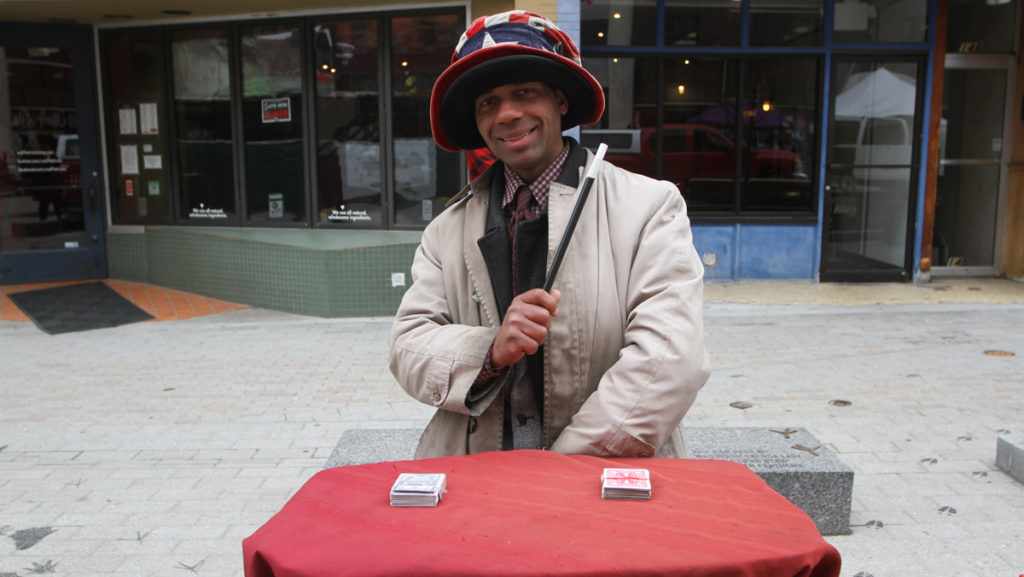“You wanna see some magic?”
It’s a frigid February night on The Ithaca Commons, and streams of students are making their way to Moonies, pushing into one another in desperate bids to escape the cold. Their voices, full of drunken euphoria and the freedom that only a Saturday night can bring, tell tales of dirtbag ex-boyfriends and friend group dramas. It’s weekend talk.
The voice from before calls out again: “Step right uppp, come see some magic! Got the best magic in town. Show you something that will blow your mind.”
Loud, with a salesman-like edge and rapid-fire enunciation, his voice reverberates through the street. It’s impossible not to hear, but most passersby ignore him, filing past with the same detached manner they might use to scroll through a series of Facebook posts. Occasionally, some make eye contact. Acknowledge his existence. But to most, he’s easily dismissible — just one more eccentric in a town full of them.
Dressed in a full-length coat with a suit on underneath and a star-spangled tie and top hat, Magic Man stands behind a large cart and taps a black-and-white magician’s wand against the cart’s red cloth covering, adding his own note to the symphony of sound around him. A hint of a beard darkens the area by his mouth. Like many in their 40s, Magic Man has started to bald.
Behind his cart, he twists 360 degrees, turning from Casablanca to Moonies and back again in his search for customers, asking every now and then whether anyone wants to see some magic. He calls out again, and this time he succeeds, as a drunk girl stumbles up to him.
Now he can do some work.
“Do you know magic?” she asks.
“Yeah, you wanna see some magic?”
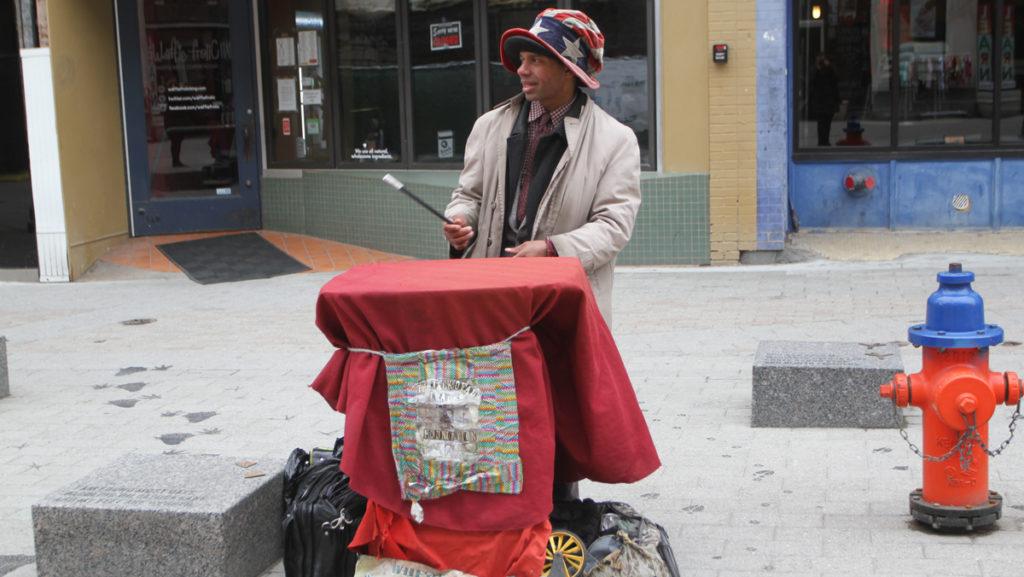
“Yeah, of course I wanna see some magic!”
He tells her that if she likes what she sees any donations go in the black bag. Magic Man begins to do a trick, asking the drunk girl to memorize a card. But before he can finish, she blurts, “I don’t have cash or anything if you want to con me. I’ve seen my dad do this before.”
“Wait,” she remembers, “I have $5 in my coat, do you want me to give you $5, sir?”
He ignores her question and proceeds with the trick, asking her to shuffle the deck.
“I’ll give you $5 anyway,” she says. “I know it’s a con.”
“No, no, it’s not a con,” he replies. He can’t let that one slide.
He guesses her card correctly, as he knew he would. “Yeah, I know it’s right,” she says, unimpressed. “Because I know this one already. My dad has taught me all this shit.”
His only customer of the night totters away to find the $5 in her coat (which apparently a friend has) but never comes back.
“I love you,” Magic Man calls out as she leaves.
“I love you too,” she yells back.
Throughout the night, he repeats this line to any girl who acknowledges him, sometimes even blowing a kiss at them, even if — as is usually the case — they are just politely declining his invitation to see some magic.
Time moves along. Groups of college women chat as they wait to enter Moonies. Magic Man eyes them and their outfits hungrily.
“I wish I could take some of these ladies home with me,” he mutters.
A few minutes later, another cluster of women catches his attention. “Nice legs,” he says quietly.
After more failed attempts to draw the crowd in, he sees some Moonies bouncers leaning against a wall, chatting with one another. “Get back to work!” he yells with a chuckle. But the bouncers ignore him. He turns away.
Just then, the voice of a frat boy–type rises above the din.
“HEY, MAGIC MAN, YOU SUCK!”
No answer. He tries again.
“MAGIC MAN, YOU STINK!”
Magic Man doesn’t even flinch.
***
Before he was Magic Man, before he stood outside on The Commons during the warmth of summer and the onslaught of winter, before he was the subject of jokes by some and admiration from others, he was just Will Metro. Born in Pennsylvania, he was adopted five days later into a family that eventually consisted of two other adopted black brothers, an adopted Korean brother and a white sister — the biological daughter of his new parents.
Growing up, Will and his family didn’t stay in one place for long, as his dad was in the military and accepted posts around the country. After Pennsylvania came Ohio, then Trumansburg, New York, and finally Mankato, Minnesota. Following each move, Will was sad to leave the friends he had made. But he knew he had no choice in the matter.
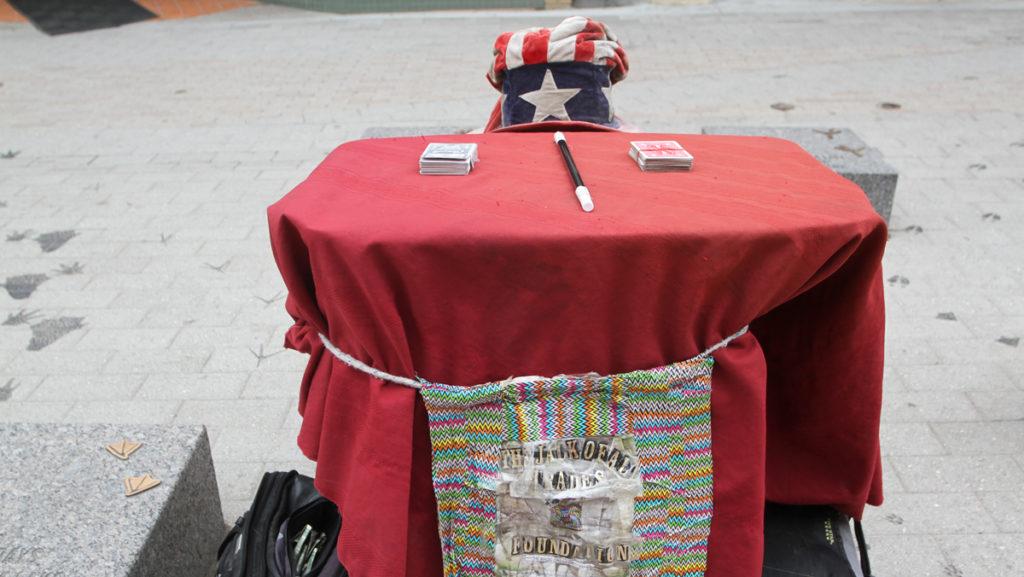
Still, despite the upheaval, he and his family were close. Will, the second youngest of his adopted siblings, never met his birth parents and never felt the desire to.
“The family I have is the family I love,” he said.
The family’s different backgrounds never became an issue. Will’s older sister Gwen remembered a Christmas card Will once gave her when he was 12 and she was 18 that illustrated how he felt about their divergent origins.
“It said, ‘You’re my sister not by blood but by love.’ He can be sweet sometimes.”
During his younger years, Will was especially close with his little brother, Matthew — the only one of his siblings he is biologically related to.
“Will and I were attached at the hip,” Matthew said. “We shared a bedroom in elementary school. We packed each other’s suitcases to run away.”
But as they grew older, the two siblings began to drift apart. Will became focused — obsessed even — on his specific interests: magic, rap and conservative politics. His dedication left little space for anything else.
Magic started first. Will’s interest was piqued when his parents got him a magic kit for his 10th birthday. The kit had everything he needed to get started: card tricks, money illusions, special-effects gimmicks. Soon, Will realized he was a natural. This was something he could do, something he was good at. Matthew said Will began to show off his newfound talent at events such as parties and funerals.
His family settled for good in Mankato in 1989, and Will attended high school there. After high school, he enrolled at Rasmussen College in Mankato, intending to study to be a child care specialist. But he lasted only a semester. His professor was sexist. She didn’t like the way he completed assignments. She was out to get him.1
He left and picked up rap again. Will said he made a total of 19 albums and a “Greatest Hits”2 before he stopped in 2004, all under the name M.C. Carpet, a moniker he got from a middle school friend who said Will’s hair felt like carpet. Will explained that he originally started rapping as a 12-year-old after meeting then-rapper Will Smith. And during his teenage years — as well as when he was in his 20s and 30s — he said he went on tours around the East Coast with well-known groups and artists such as Run-D.M.C., LL Cool J, Heavy D, Warren G and Biggie Smalls; he even had videos featured on MTV. He was famous. It was awesome.3
Perhaps more accurately, after dropping out of college, Will moved around to a smorgasbord of places, seeing his family less and less often as he traveled farther and farther away. After Minnesota, he lived in Michigan, which was followed by a move to Trumansburg. He’d made good friends there as a kid and had always wanted to return. But evictions and trouble keeping up with rent forced him to move away from Trumansburg to other towns and cities in the area. Newfield, Enfield and Elmira all came and went in the intervening years.
Then, a breakthrough.
***
Will wanders around the Wegmans in Elmira, not entirely aware of where his feet are taking him. The people bustling about around him grabbing things from food-stocked shelves are blurs as his mind whirls.
How had it come to this? It’s 2011, and he’s somehow ended up in a middle-of-nowhere place with nothing happening as far as he’s concerned, selling high-end vacuums door-to-door. It isn’t his fault, he reassures himself. He’d done everything he could when he got here in 2009 to find a good job to support his family. But no one except the Kirby Company, a manufacturer of vacuums, was hiring, and he hadn’t really had a choice whether to take the job, not with two small children and a girlfriend on welfare to support.
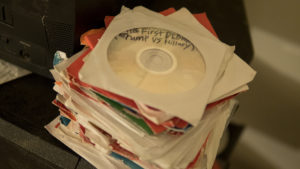
The vacuum gig turned out to be the toughest job he’d ever had, as it was based on the notion that people would want to buy a $2,100 vacuum from someone knocking on their door. Sure, he could reduce the upfront price for people. And he knew to target those who looked wealthy, those who had nice-looking cars in the driveway. Still, as the months went by, he wasn’t selling many vacuums. And he was working on commission. For a while now, Will had been considering quitting. He felt that he needed to do something else with his life.
As he walks, Will is aware of the Wegmans’ book section up ahead of him, and his eyes are drawn to one title in particular. Black and green block lettering and a large picture of a hundred-dollar bill adorn the cover, which reads, “Get Real, Get Rich: Conquer the 7 Lies Blocking You From Success.”
Will is intrigued. He buys the book and sits down to read it when he gets home. What he sees impresses him. Being an entrepreneur. Running your own business. Incorporating your passions into your craft. The book expresses exactly what’s been missing from his life. And as he reads, the broad brushstrokes of an idea form.
He’ll continue going door-to-door in Elmira. Except instead of selling vacuums, he’ll sell something else, something better: magic. He’ll use what he learned when he was a kid, as well as the more complex magic skills he’s honed through the years. Rather than being a fun way to pass the time, magic will become his career, his source of income. An amateur couldn’t do it. But he’s not an amateur. He’s been doing magic since he was 10. And he also knows a thing or two about persuasiveness, how to sell a person something even if they don’t want it. That’s what he learned at the Kirby Company: It takes seven no’s to finally get a yes.
Invigorated, he begins going door-to-door with his magic act. But to his surprise and dismay, the welcomes he receives are frosty. Sure, some people enjoy the magic and give him a few bucks, but many are hesitant when he knocks on their door, suspicious of him and his motives. A few times, he is even pulled over by the police. Apparently, you need a license to go up to people’s houses and try to sell them things, even if that thing is magic.

At the end of the first week, he’s earned just $25. He needs more than that.
And as if that weren’t enough, his personal life is falling apart. A little before he found the book at Wegmans, he’d gotten a phone call. It was the Department of Social Services, calling to inform Will and his girlfriend of four years that in order to receive full aid for her and the kids in the form of welfare, she and Will have to live in separate houses. He couldn’t believe it. The system was forcing him away from his family.4
Another example of the government ruining everything.
The DSS intervention eventually spells the death of his relationship with his girlfriend. Except for the kids, there’s nothing left for him in Elmira, as his magic business continues to disappoint. His thoughts turn to the last place he felt truly secure. He’d had a good life in Tompkins County, working a steady job at Center Ithaca bussing tables, before he got dragged out to Elmira by his girlfriend, who wanted to live closer to her family. He doesn’t want to lose his kids, but Elmira isn’t that far. He can come back and visit whenever he wants. Another idea emerges, too. What if Ithaca is a better place for his magic show?
That summer, he takes the leap, packing his bags and moving to Ithaca.
***
At least it’s not crowded.
Will takes his time moving through the aisles of the Ithaca Walmart, pausing occasionally to examine a product. There’s no hurry, though — none of the urgency that so often pulsates through the retail chain.
Of course, maybe that’s because it’s 3 in the morning.
Will’s move to Ithaca hasn’t gone exactly as planned. While he successfully sets up his magic show on The Commons and is making more money than he did in Elmira, it’s not enough to afford an apartment, and he finds himself homeless.
He isn’t in a dire situation. It’s summer, and he’s earning enough to buy food. Plus his idea of walking around stores that stay open 24 hours is working out nicely. Still, this isn’t what he envisioned when he came to Ithaca.
Will’s sojourns to Walmart and other 24-hour Ithaca stores continues for another two months. But as summer turns into fall, Will tires of not having a place of his own, and he finds an advertisement for an apartment that he just might be able to afford.
He moves into the apartment, located above Maxie’s Supper Club. But in reality, he can’t afford it, not on the strength of his magic show alone. Evicted, he’s homeless for the second time. And now it’s winter.
Will tries to get a spot at the shelter, but it’s full. He retreats back to his Commons-Walmart continuum. After a few months, though, he catches a break. He meets one of the people who run Second Wind Cottages, a provider of housing for homeless men, after a friend mentions the group to him. They have an application, and he fills it out. He’s in.
Second Wind, located in Newfield, ends up being the most stable living situation he’s had in a while. Will stays there for almost four years, continuing his magic show on The Commons all the while.
Eventually, Second Wind points him toward the charitable group Tompkins Community Action, which agrees to pay a portion of his housing costs. He now gets about $750 out of his $895-a-month rent paid for an apartment near Ithaca High School.
With a place of his own, he can focus on magic. Out on The Commons from Monday to Saturday (on Sunday he goes to the movies5) for around 13 to 15 hours a day, Will makes an average of $100 a day.6
Finally, after a long struggle, he’s made it in Ithaca. But more important than the hard times he’s been through is that he’s created a business where he lives and loves what he does.
And for him, that’s really all that matters.
***
He’s ready. The research is done, the logo is up and the camera is rolling.
Will, dressed in a dark brown suit, takes a deep breath. Then, in a voice he’s honed over the years, he announces the beginning of the show.
“Alright, let’s get this party started. You are watching “Politicalllllllll Poinnnt Magazine.” Wherrrrrrrre the Right is Right! And the Left … wellllll, the Left is always on the wrong side of history.”
As he speaks, trumpet music — the kind played in old-timey movies when the heroes come back victorious from war — sounds in the background, occasionally so loud that it eclipses his words.7
The music continues as Will runs through the night’s top stories, which appear on the TV screen in block letters set against a gray background. It’s August 2016, and the presidential election is heating up.
“Well, well, oh my gosh,” he says with a slight smile. The first story reads, “HILLARY IS OFFICIALLY DAMAGED GOODS *HillaryGate* PART 42.” The next one down says, “HILLIARY PLAYS THE RACE CARD ON DONALD TRUMP: (IS THIS A LOWBLOW DEFLECTION?)” Yet another headline asserts that “TRUMP IS CLOSINT IN ON CLINTON IN THE POLLS: (TRUMP HAS THE EDGE UP).”
Will dives into the night’s hour long show.
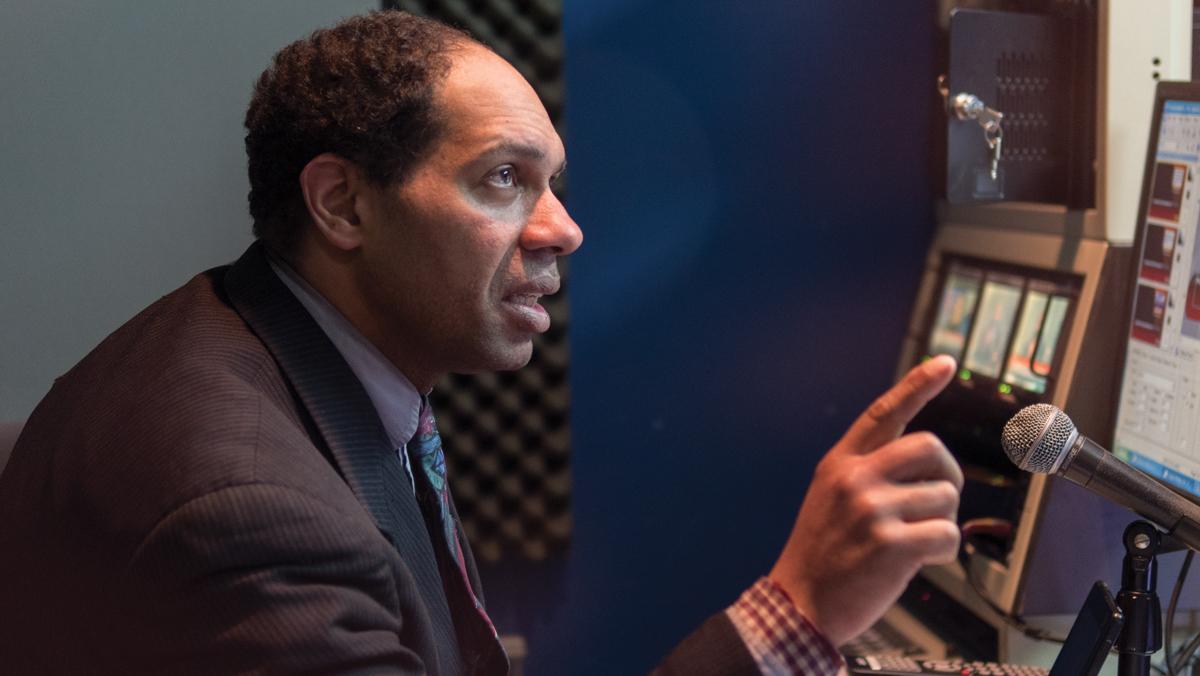
“Hillary has had a bad… a rough couple of weeks now,” he says. “A bad, a bad two weeks. Because the emails that… that were released. And now… and now everything is kind of falling apart for… for Hillary because her lies are getting out there.”
Despite the stutters and pauses, Will is confident. He’s been making the show once a week since 2004, except for the year and a half he was in Elmira when the show was on “hiatus.” He knows how to produce a compelling hour of television.
Before “Political Point,” Will was doing a show about hip-hop. But after he kept seeing a bunch of liberal TV shows spewing garbage, he decided to take matters into his own hands.
He knows, from some of the complaints he’s gotten, that the show is getting to liberals. He remembers once, after he read an article in The Ithacan back in 2005 about a college student who tried the drug salvia to get an out-of-body experience, he commented on his show that if she wanted an out-of-body experience, she might as well have killed herself. Of course, someone took the comment the wrong way. Typical liberals — so quick to jump to conclusions. They thought he was advocating suicide. But of course, all he was doing was making an analogy.8
No matter what anyone else says, Will views his show as a service. The left needs to be counteracted and challenged with facts and accurate reporting. The mainstream media won’t do it. They’ve set themselves against Republicans. What’s needed is real, honest journalism like he does on his show. That’s why every year since 2004, he’s submitted the show for the PEGASYs Awards, which honor excellence in public, governmental and educational access TV in Tompkins County. He never wins, but he jokes that it’s because all the judges are liberals.
Even though it doesn’t get the credit he thinks it deserves, the show has spurred some local curiosity and has made him a figure around town. He’s been asked why, given his political beliefs, he lives in Ithaca. He responds that it’s a good place for business. Plus, even though he thinks liberals are some of the most intolerant people he’s ever met, he enjoys proving their ideas are flawed.
Will has also been asked why he’s a black Republican — and a Trump supporter at that. But he’s got his talking points lined up. The Republican Party freed the slaves. And the GOP voted in higher numbers than Democrats for the Civil Rights Act in the 1960s. The Ku Klux Klan was founded by Democrats. And many Southern Democrats tried to stop civil rights marches in the ’60s.
But Will’s political leanings are also related to his upbringing. Growing up, he was always traditional, as was his dad, whose favorite president was Ronald Reagan. And being born in 1976, Will was raised in the Republican stronghold years of the 1980s.
While many in Ithaca are surprised that he’s a Republican, to his brother Matthew, Will’s gravitation toward conservatism fits perfectly with his personality. Matthew, who doesn’t have any communication with his brother anymore because of the vast differences in their beliefs, said his brother is extremely stubborn in the directness of his opinions and doesn’t have the capacity to acknowledge any validity to conflicting ideas.
Will wasn’t always a Republican, though, even though he was always a conservative. In the 1990s, he supported independent candidate Ross Perot, who ran on a platform of fiscal conservatism, economic nationalism and law-and-order policing. As the years went by, though, Will realized that his independent status and support of third-party candidates was preventing him from having any real voice in the political system. As a result, after being impressed by George W. Bush’s 2000 presidential campaign, he became a registered Republican.
Since then, he’s never looked back. When people ask him to describe his politics, he tells them, proudly, that he’s a Reagan Republican and a Bush conservative. And now he’s a Trump Republican, too.
That night’s “Political Point” episode is coming to a close. In his last segment, Will attacks Libertarian presidential candidate Gary Johnson over his views on marijuana.
“Marijuana triggers psychosis and leads to several disorders like schizophrenia. And it can and will kill you,” he says, shaking his head knowingly before challenging Johnson to come on the program and debate him.
He then thanks viewers for watching “Political Point Magazine,” where the right is right and the left is always on the wrong side of history. The trumpet music blares, and Will’s face disappears from the screen.
Not to worry, though. He’ll be back again next week.
***
The show is over and the camera is off. But there’s no time to relax. Preparation for next week’s show is already underway.
Will searches for the remote amidst the clutter of food wrappers and papers that fill much of the closet-sized studio. He finds it and directs his attention to a small TV, where Sean Hannity is on. Taping the show so he can use clips for the next Political Point episode, he stares at the talking head on the screen, nodding approvingly every now and then as Hannity flays Obama and Hillary while lauding Trump.
Now there’s a man who knows what he’s talking about.
The first segment of Hannity ends, and it’s Will’s cue to go. The studio shuts down at 9:30, and there’s not enough time to tape another segment. He walks through the abandoned building, retrieving his coat, hat and the cart he brings with him everywhere.
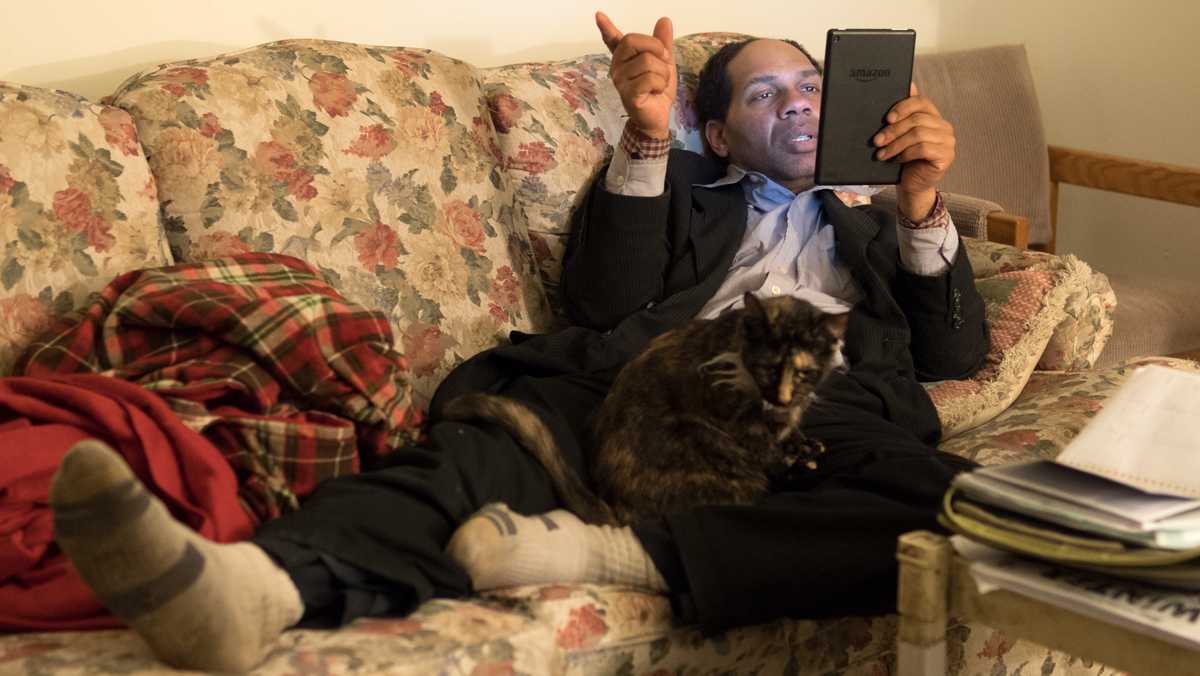
Will steps out into the night, pushing the cart in front of him, and begins his 45-minute walk home to his apartment near Ithaca High School. All is quiet, save for the occasional roar of a car going by. Walking at a steady pace, Will rarely looks up. He knows the way.
As he moves through the dark streets of Ithaca, Will’s mind is still on his show. Already, he’s planning next week’s episode, mentally compiling a list of the stories and clips he’ll use. Entrenched in his own world, the walk goes quickly. Soon, he hangs a left and pushes his cart into a horseshoe-shaped apartment complex.
Will makes his way to the building farthest from the road. From there, it’s just a simple process of walking up two wooden staircases backward. He knows from experience this is the only way to get his cart up the steps.
Clack… clack… clack. He maneuvers one set of stairs, carefully moving the cart up each step. Clack… clack… clack. He conquers the other set.
After navigating the obstacles, Will arrives at the door to his apartment. As he jiggles his key in the lock, a meow sounds from inside.
“Come on, you know the drill,” he says as the door swings open.
“Step back, come on.”
Two cats, one large and auburn-colored, the other dark and skinny, eagerly greet Will by rubbing up against his leg, their purring a murmur in the otherwise silent apartment. He reaches down and scratches them behind their ears.
Stashing his cart in a small closet, Will moves into the living room. Four VCRs, a DVD player, a pile of CDs and a small TV are stacked on a large storage tower. A desk, with pictures of his 8- and 9-year-old sons — he mostly sees them on holidays and assorted weekends — has been pushed against vanilla ice cream–colored walls. Opposite it is another desk adorned with a defunct computer and streams of loose newspapers, candy bar wrappers and old movies.
Will reaches for one of the CDs on the storage tower and pops it into the DVD player. Sinking into the couch, he presses the power button and yesterday’s Hannity episode begins to play.
He has to keep up. His viewers depend on it.

During commercial breaks, Will takes out his tablet. He checks to see if his neighbor’s WiFi network comes up. It doesn’t. No Breitbart or Newsmax for him tonight. He’s stuck with the fake-news Washington Post — or “Washington Compost” as he calls it — which came automatically with the tablet. Still, it’s news, and he begins reading.
The Hannity episode ends. Will puts down his tablet and steps across the carpet, dodging loose pieces of trash and black fuzz as he makes his way toward a third desk, stacked high with books. His own personal library runs four columns wide and 20 books high. Except for the Bible, all the titles are related to politics.
He selects two of the books and settles back down on the couch. Will opens up to where he stopped in “My Life” by Bill Clinton and begins scanning through, eager for what comes next. He finishes the chapter and gleefully opens its companion “Because He Could,” Dick Morris’ rebuttal of Clinton’s memoir, devouring a chapter and smiling as he reads.
So many lies exposed.
He keeps reading. But eventually, the words on the page no longer make sense and it becomes a struggle to stay awake. His eyes close.
He’ll read the next chapter tomorrow.
***
It’s 11 p.m. on a cold March night on The Commons. Magic Man, who mysteriously disappeared for a week,9 is back in his usual spot in front of Moonies, hailing people on the street. He’ll stay there until the bars close at 1 a.m. and then go over how much money he’s made that night. It’ll be 2 or 2:30 before he gets home.
But despite hours that go into the early morning, Magic Man plans to be in Ithaca performing his act for the rest of his life (as long as he doesn’t come to his senses and move somewhere warm). After all, he’s living the American Dream. He loves what he does, and he plans to work it until the day he dies.
Still, it hasn’t been the best night for him. There is an unusual number of older people out on The Commons for a weekend night. And while most students are used to his appearance and mannerisms, many adults are not.
An older woman who says she’s waiting for someone spots Magic Man at one point and ambles over. He asks her if she wants to see some magic.
“I know all about magic,” she responds.
“I’m the best magic in town.”
“You’re the only magic in town.”
Magic Man doesn’t react. He studiously ignores the woman, turning his attention to the crowd of people passing by.
The woman turns to him again. “Well, I hope you make some money.”
“I do every day,” he says, defensiveness in his voice.
“Yeah, $1.” She laughs at her own joke.
Soon, the woman leaves. But right after, a balding man and his friend approach Magic Man.
“You wanna see some magic?”
“Sure,” they say.
He reminds them that any donations go in the black bag.
“Hold on,” one of the guys says. “You can’t do that up front; you have to earn it first.”
“LISTEN, I’VE BEEN DOING THIS A LONG TIME. I KNOW WHAT I’M DOING. YOU DON’T TELL ME HOW TO RUN MY BUSINESS,” Magic Man yells.
The man backs off. “Okay, okay.”
Magic Man continues with the trick. He successfully completes it without any trouble and receives a dollar as his reward. He’s pleased with how the interaction went. They tried to throw him off, but he showed them.
As the night drags on, The Commons gets more crowded.
“Now we’re getting busy,” Magic Man says.
Toward the end of the night, a student with glasses and short brown hair asks to see a trick. Magic Man shuffles the deck and tells the guy to pick a card. He holds the deck up to his ear, listening for … something. Then, like it’s the easiest thing in the world, he correctly guesses the card.
“How’d you do it?” the guy asks, impressed.
“Magic.”
______
1 This was all I could get out of him about his time in college. He likes pontificating about politics. Talking about his personal life? Not so much.
2 He was in the hip-hop genre of rap, so he mostly did “positive stuff.” Whatever that means.
3 Nothing about this story makes me think it is true.
4 When pressed for more details, he simply repeated that the system separated them. I kept asking. He kept repeating variations of “It was the system’s fault.” I gave up before he did.
5 In an additional update to his schedule, he told me that he’s recently stopped working Tuesday nights, instead going to karaoke at Silky Jones. If you’re wondering whether he sings, fear not. He favors songs by Smash Mouth, Weird Al and Journey.
6 A dubious claim. During the three or four nights I hung out with him, only a few people came by to see some magic, with each person donating a dollar or two. You do the math.
7 If you get the chance, you can watch one of the episodes of his show here: https://www.youtube.com/watch?v=l6zVNd08Ee8. It combines the production quality of “The Room” with the noxious, conspiratorial politics of Infowars.
8 Sure was a weird one.
9 I’m not entirely sure whether he went somewhere or just wanted to avoid my incessant questioning. Either way, when I saw him again and asked him where he had been, he instead asked me where I had been. Typical.


